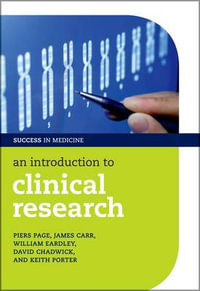
At a Glance
Hardcover
$304.40
Aims to ship in 15 to 25 business days
When will this arrive by?
Enter delivery postcode to estimate
Theory of Drug Development presents a formal quantitative framework for understanding drug development that goes beyond simply describing the properties of the statistics in individual studies. It examines the drug development process from the perspectives of drug companies and regulatory agencies.
By quantifying various ideas underlying drug development, the book shows how to systematically address problems, such as:
- Sizing a phase 2 trial and choosing the range of p-values that will trigger a follow-up phase 3 trial
- Deciding whether a drug should receive marketing approval based on its phase 2/3 development program and recent experience with other drugs in the same clinical area
- Determining the impact of adaptive designs on the quality of drugs that receive marketing approval
- Designing a phase 3 pivotal study that permits the data-driven adjustment of the treatment effect estimate
- Knowing when enough information has been gathered to show that a drug improves the survival time for the whole patient population
Drawing on his extensive work as a statistician in the pharmaceutical industry, the author focuses on the efficient development of drugs and the quantification of evidence in drug development. He provides a rationale for underpowered phase 2 trials based on the notion of efficiency, which leads to the identification of an admissible family of phase 2 designs. He also develops a framework for evaluating the strength of evidence generated by clinical trials. This approach is based on the ratio of power to type 1 error and transcends typical Bayesian and frequentist statistical analyses.
Industry Reviews
"'In each chapter, author provides appropriate statistical formulas that readers can actually utilize. Since this book handles many mathematical formulas, and contains many real good examples, this book would be very useful for statisticians who work at pharmaceutical companies and are deeply involved with drug development ... Overall, this book covers necessary and important aspects for drug development, and would be quite useful to clinical statisticians."'
-Byung-Ho Nam, PhD, Department of Cancer Control and Policy, Graduate School of Cancer Science and Policy, National Cancer Center, Korea, in Biometrics
"The given book presents a theory of drug development that is based on maximizing the efficiency with which drugs that truly provide clinical benefits are identified. The author shows how to optimize the drug development process at its three main stages (Phases 1, 2, 3), and at some transitional sub-stages, so that the number of molecules that result in a positive final Phase 3 clinical trial per investment is maximized."
-Fatima T. Adylova in Zentralblatt MATH
"'In each chapter, author provides appropriate statistical formulas that readers can actually utilize. Since this book handles many mathematical formulas, and contains many real good examples, this book would be very useful for statisticians who work at pharmaceutical companies and are deeply involved with drug development ... Overall, this book covers necessary and important aspects for drug development, and would be quite useful to clinical statisticians."'
-Byung-Ho Nam, PhD, Department of Cancer Control and Policy, Graduate School of Cancer Science and Policy, National Cancer Center, Korea, in Biometrics
"The given book presents a theory of drug development that is based on maximizing the efficiency with which drugs that truly provide clinical benefits are identified. The author shows how to optimize the drug development process at its three main stages (Phases 1, 2, 3), and at some transitional sub-stages, so that the number of molecules that result in a positive final Phase 3 clinical trial per investment is maximized."
-Fatima T. Adylova in Zentralblatt MATH
ISBN: 9781466507463
ISBN-10: 1466507462
Series: Chapman & Hall/CRC Biostatistics Series
Published: 24th October 2013
Format: Hardcover
Language: English
Number of Pages: 262
Audience: General Adult
Publisher: Taylor & Francis Inc
Country of Publication: GB
Edition Number: 1
Dimensions (cm): 23.8 x 17.2 x 2.2
Weight (kg): 0.52
Shipping
| Standard Shipping | Express Shipping | |
|---|---|---|
| Metro postcodes: | $9.99 | $14.95 |
| Regional postcodes: | $9.99 | $14.95 |
| Rural postcodes: | $9.99 | $14.95 |
How to return your order
At Booktopia, we offer hassle-free returns in accordance with our returns policy. If you wish to return an item, please get in touch with Booktopia Customer Care.
Additional postage charges may be applicable.
Defective items
If there is a problem with any of the items received for your order then the Booktopia Customer Care team is ready to assist you.
For more info please visit our Help Centre.
You Can Find This Book In
This product is categorised by
- Miscellaneous Items
- Non-FictionScienceBiology, Life Sciences
- Non-FictionMathematicsProbability & Statistics
- Non-FictionMedicineOther Branches of MedicinePharmacology
- Non-FictionMedicineMedicine in GeneralPublic Health & Preventive MedicineEpidemiology & Medical Statistics
- Non-FictionEngineering & TechnologyIndustrial Chemistry & Manufacturing TechnologiesIndustrial ChemistryPharmaceutical Technology
- Non-FictionMedicineNursing & Ancillary ServicesPharmacy & Dispensing
- Non-FictionMedicineMedicine in GeneralMedical Equipment & TechniquesMedical ResearchClinical Trials
























